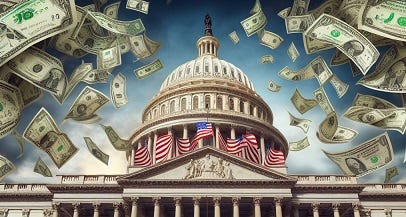trending
neon
Cirque du Soleil offers summer ticket deals
dining out
Celebs ditch the Strip for iconic Henderson restaurant
july 
trending
neon
Cirque du Soleil offers summer ticket deals
dining out
Celebs ditch the Strip for iconic Henderson restaurant
july 

The U.S. government plays a key role in shaping investment strategies through regulatory frameworks, fiscal policies, and incentives. Explore how these factors impact business decisions and investment trends




The U.S. government has a profound influence on the nation’s investment landscape, with policies that guide, regulate, and incentivize both domestic and international investments. From tax reforms to trade policies and regulatory frameworks, government actions help shape the investment strategies of businesses, institutional investors, and individuals alike. Understanding the government's role is crucial for anyone looking to navigate the U.S. investment environment and optimize investment decisions for growth, profitability, and sustainability.
The U.S. government establishes a comprehensive regulatory environment to ensure the stability, transparency, and fairness of financial markets. These regulations affect everything from securities trading to corporate governance, shaping how investments are made.
The SEC plays a vital role in protecting investors and maintaining fair, orderly, and efficient markets. By enforcing regulations around securities trading, reporting requirements, and corporate disclosures, the SEC ensures that companies are transparent in their dealings, thus reducing risks for investors.
The U.S. Federal Reserve has a significant role in shaping investment strategies through its control of monetary policy. The Fed influences interest rates, inflation, and liquidity in the economy, which in turn impacts the returns on investments.
The U.S. government’s fiscal policies, particularly tax reforms, play a significant role in influencing investment strategies. By offering tax breaks, credits, and incentives, the government encourages businesses and individuals to invest in specific sectors and projects.
Tax cuts, such as those introduced under the Tax Cuts and Jobs Act (TCJA) of 2017, lower corporate tax rates, making the U.S. a more attractive destination for both domestic and foreign investment. The reduced tax burden on businesses allows companies to reinvest their savings into operations, growth initiatives, and expansion efforts.
The government encourages individual investment through tax-advantaged accounts like 401(k)s, IRAs, and Health Savings Accounts (HSAs). These vehicles allow investors to defer taxes on their earnings, which can compound over time, leading to higher returns in the long term.
The U.S. government’s trade policies have a significant impact on investment strategies, particularly for businesses engaged in global markets. Trade agreements, tariffs, and foreign investment policies dictate the flow of capital and goods between the U.S. and its trading partners.
Trade agreements such as the United States-Mexico-Canada Agreement (USMCA) and previous agreements like the Trans-Pacific Partnership (TPP) (before the U.S. withdrawal) enhance access to foreign markets and encourage businesses to invest in international expansion.
The U.S. government actively encourages foreign direct investment (FDI) through policies that make it easier for foreign investors to establish businesses or acquire U.S.-based companies.
In times of economic downturn, such as during the COVID-19 pandemic, the U.S. government plays a crucial role in supporting business and investment activity through stimulus packages and recovery plans. These interventions help stabilize the economy and provide businesses with the capital needed to weather financial challenges.
The government uses stimulus packages to inject capital into the economy, either directly through checks to individuals or through business loans and grants.
Government policies supporting infrastructure investments, such as the Bipartisan Infrastructure Law, stimulate economic growth by providing capital for the construction and upgrade of national infrastructure systems. This leads to job creation, increased demand for goods and services, and opportunities for investors in sectors like construction, transportation, and technology.
The U.S. government is also focusing on sustainable investments and innovation, with policies that encourage businesses to align with environmental, social, and governance (ESG) principles. These policies shape long-term investment strategies and open up new opportunities for growth.
Policies that promote renewable energy, clean technology, and carbon reduction are transforming the investment landscape.
The U.S. government plays a key role in shaping investment strategies through regulatory frameworks, fiscal policies, and incentives. Explore how these factors impact business decisions and investment trends
the latest

UK Winter Energy Supply Seen as Secure Despite Tight Gas Margins
UK grid operators say that, though gas supply margins are tighter due to falling domestic production, the country's gas and electricity systems are expected to remain reliable this winter.

Gulf Markets End Mixed on Oil Prices and US Rate Cut Hopes
Gulf markets closed mixed as investors weighed rising oil prices against optimism over a potential U.S. rate cut, impacting stocks in Dubai, Abu Dhabi, and Riyadh.

Starmer’s India Visit Seeks to Boost Trade Deal Impact
British Prime Minister Keir Starmer begins a two‐day India visit with over 100 UK business and academic leaders to promote the recently signed UK-India free trade agreement aimed at boosting exports and investment.

UAE Reaches 640,000 Corporate Tax Registrations
The UAE has reached 640,000 corporate tax registrations as the Federal Tax Authority reports record filings and announces deadline relief for businesses.

UAE to Tax Sugary Drinks Starting January 2026
The UAE government will implement a sugar-level tax on beverages starting January 2026, targeting soft drinks, juices, and energy drinks to encourage healthier consumption.

UAE National Month Campaign to Celebrate Flag Day, Unity
The UAE will run a month-long national campaign from November 3 to December 2, highlighting heritage, unity, and patriotism in line with Flag Day and National Day celebrations.

UAE Introduces New Visit Visas for AI, Cruises, Events
The UAE government has launched four new specialized visit visas targeting professionals and visitors in AI, cruise tourism, events, and entertainment sectors to boost business and tourism.

UK May Scrap Visa Fees to Attract Top Global Talent
The UK government is considering removing visa fees for top global talent as part of efforts to boost innovation, attract skilled workers, and grow the economy.

UK Won’t Impose VAT on Private Healthcare, Says Minister
The UK government has ruled out imposing VAT (sales tax) on private healthcare services, according to Health Minister Wes Streeting, despite speculation ahead of the upcoming budget.